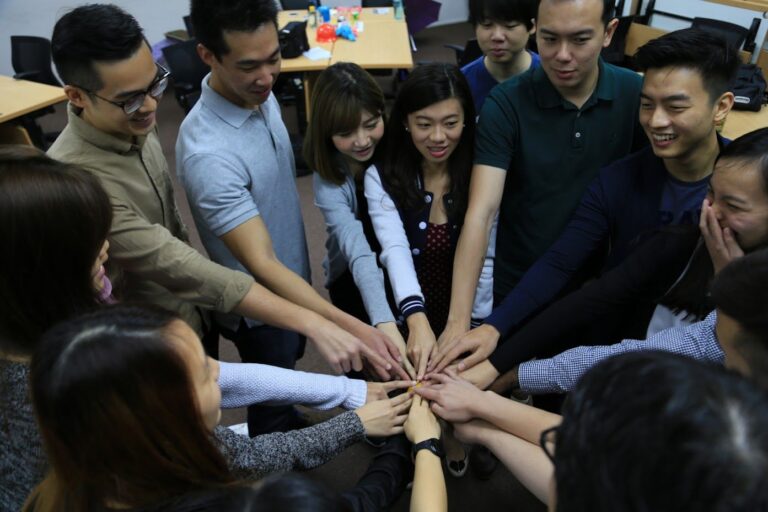The Second Generation Dilemma
Government entities, MNCs and some local organisations do have proper ways of planning their employees’ careers. Preparing them for leadership positions is part of that, if they foresee such need. Many high quality leadership trainings in all kind of duration and focus are available for anyone to take up.
Our frequent interaction with SME leaders has taught us that such planning is rarely on their radar screen. It is pretty clear – but unspoken – that daughter or son are supposed to take over the business that has been built by their parents or grandparents over the past decades. Many of them do not think about preparing their successors in a structured way. They might not be aware of the need for a structured succession planning. And they may not have the know-how.
At the same time, the SME is made of two groups of employees: Firstly, there is the group of staff who grew up with and stick to the founder. Secondly, there is the group of people who were hired recently. Very often, they get in, smell too much SME and get out. They are not against SME, otherwise they would not have considered SME in the first place.
When the founder of the family business started some 30+ years ago, it was ok to lead by command and control whilst authority was given by ownership and hierarchy. This has changed over the years. Employees are rightfully more demanding. They may not stay very long when they experience some traditional leadership styles.
“We need to train our employees for better performance,” is a statement by the second generation.
“Training them? I hire them to do the job! We do not waste money on that!” is a rather common sentiment by the older generation.
Work, workplace and workforce have changed since the early days of the founder. This change may have resulted in a second generation dilemma.
Issues Second Generation Leaders May Face
In order to overcome them, it is necessary to face potential succession issues and their root causes first.
Not Knowing the “Real Business”
When the next generation grew up, they saw mummy and daddy running the business more or less without the kids getting involved. They got to enjoy the benefits but did not get exposed to all the ups and downs the older generation had to go through. Mummy and daddy have been shielding them. As a result, the next generation may have a biased perspective on the business and may not be prepared for hardship.
Not Planning for Succession
In families who own a business, succession planning is rarely a topic discussed at the dinner table. If there is only one successor, there seems to be no need for any discussion. If there are siblings, the unspoken assumption is often that the eldest sibling takes over.
The parents go on running the business hoping that one day someone will be ready and willing to take over. Part of the reason for that is, that they do not know better. Yet, without preparation, this someone might not be ready. And, without a heart-to-heart talk in the family they may not know that this someone made other plans already.
Not Giving the Successor a Chance
In some family businesses, the father has passed the baton to the successor, but not really. Officially, daughter has the responsibility. But daddy is good in micro managing and likes to handle things his own way. This is especially harmful when daddy and daughter give conflicting messages.
Of course, employees would first follow the father even if the daughter has the title “CEO”. Some of the employees have been working with the father for many years.
The reason for father intervening is mostly, that he has much more experience and has seen all situations before. He knows how to fix things. Daughter doesn’t. And she will never get a chance to learn if daddy keeps fixing things for her and, by the way, greatly undermining her authority.
What Can They Do?
Learn the Business in All Its Facets
The older generation needs to involve the kids as soon as possible in business dealings. This involvement must not be limited to drinking sessions with important clients but must involve the tough negotiations with those, with suppliers and bankers. And, they must experience all the setbacks and the ways out of them.
A formal management trainee or internship program will help. If potential successors join the business first as employees reporting to someone else, they would have the chance to develop much needed social business skills including a sense of humility.
Planning for Succession
There is no harm in sitting together in the family to talk about the future of the business. Sometimes it is of an advantage to have an external facilitator. The question of who is the successor should not be answered by age but by who is most suited, prepared and willing. Suitability has less to do with technical skills but much more with leadership skills and attitudes. Having the wrong successor might be breaking the business.
Build a proper succession plan and follow through. This succession plan could include above mentioned internship and other ways of joining and learning the ropes.
The best leadership development programs in MNCs rotate the candidates through the organisation over a longer period with serious involvement, objectives and performance appraisals. Such program could help the potential successors at SMEs greatly.
After Handing Over
For the founder of the business, it is very hard to let go. Part of the reason is that no one knows the business, its products and services and all people involved better than the founder. After officially handing the business over to son or daughter, they should be named CEO or MD for everyone to know that there is a big change. And there is no way for the father to keep going as before.
The family should work out a clear set of rules that lines out roles and responsibilities for all family members. The founder does not need to be out, but can move into an advisor role to support the new business leader. It must be clear that the first point of contact is now the successor and not the father. It is the job of the successor to seek advise from the father if necessary.
This can certainly lead to arguments about how to do things. Yet, the stage for such arguments is not in front of others.
It is very easy for the much more experienced father to show that he knows – and demoralise the new leader up to the breaking point.
“If you want to do it your way, go ahead. I can work somewhere else!” heard from one of these young leaders is a strong signal that the father has forgotten his role.
Conclusions
At an MNC, people who are best suited for the job will eventually get hired. Mostly. At a family business, you are often limited to family members especially when it comes to filling key positions. Hence, formal long-term succession planning should be done early by involving all family members.
This succession planning should include a solid development plan to equip the potential successor with necessary knowledge, skills and attitudes. Part of this development could be exposing the successor to the outside world by having her/him working in another organisation. Not only is this a great way of learning, it also brings often missing new ideas, different ways of doing things, a different mindset to the family business.
So, do you have a plan how to hand over your baton?
Is it written down and communicated?










